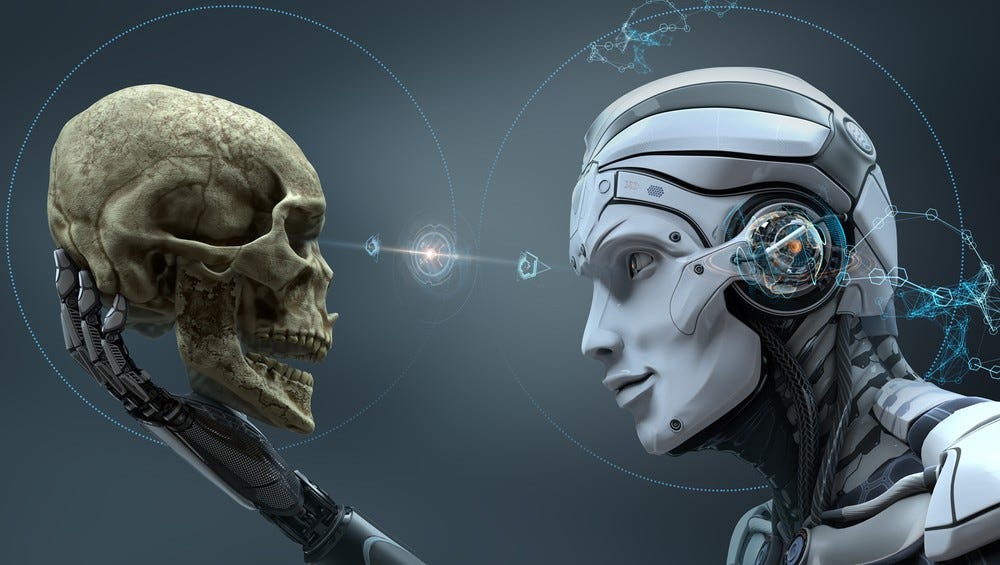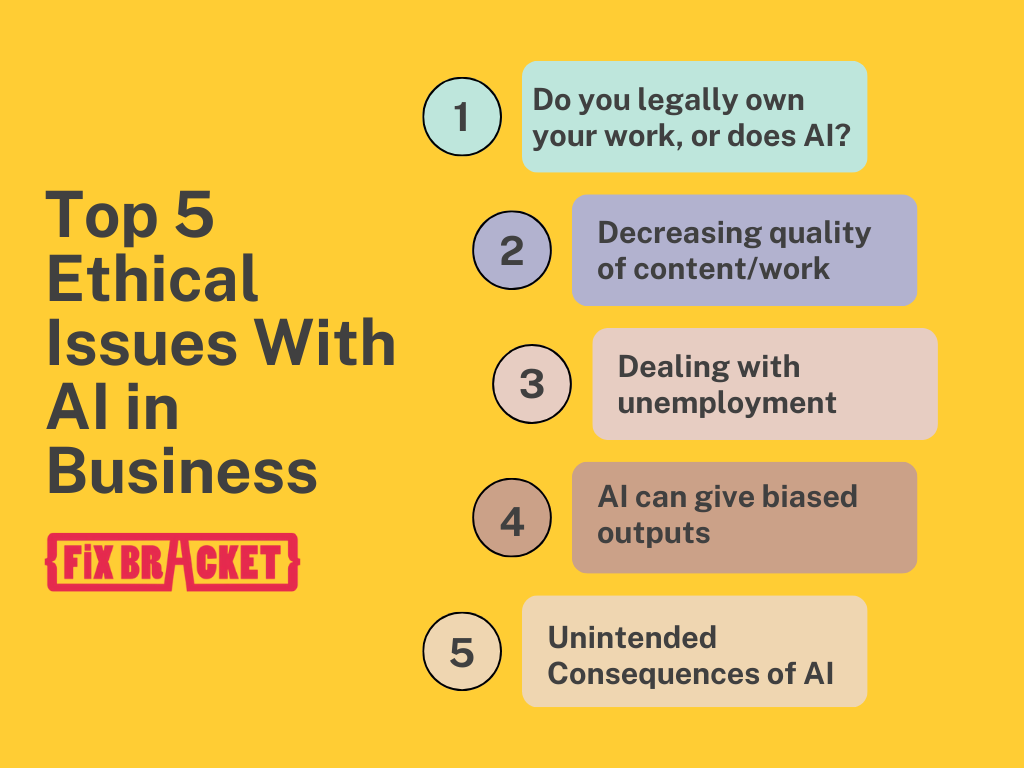
Everyone’s talking about AI in business.
It’s everywhere, and we’re getting hit with all these new AI tools and apps. Trying to keep up with the latest trends is like trying to catch a greased pig – tough. And figuring out which tools are worth using. That’s a whole other challenge.
But here’s the deal – AI isn’t a magic fix. It’s got its own set of problems, especially when we’re talking about AI in business.
I’ve never gotten anything from GPT that I’d proudly slap down word-for-word anywhere. It’s always a combo of human brainpower and tech. AI can toss out ideas, but it’s on us to fine-tune and perfect those ideas. It’s a partnership thing.
In this article, we will discuss the role of AI in business and the ethical issues that will arise when AI starts penetrating business operations deeply.
How Deeply Has AI Penetrated Business Operations?

How harmful is AI?
Alright, so let’s dive into this whole AI in business thing. It’s like AI has set up camp in the very fabric of how businesses operate these days. From crunching numbers to customer service, AI’s got its fingers in every pie.
Take ChatGPT, for example. It’s like your virtual brainstorming buddy.
You throw a question its way, and it dishes out ideas like a brainstorming session on steroids. But here’s the kicker – it’s not about letting AI take the wheel entirely. No, sir. It’s about teaming up, like Batman and Robin. You get the AI to shoot out some killer ideas, and then it’s over to you to polish them up, add that human touch, and make them shine.
AI Need To Assist Humans, Not Automate
We’re talking about a dynamic duo here – humans and AI.
Imagine having a sidekick that crunches through data at the speed of light, leaving you with more brainpower to focus on the creative, the strategic, the things AI can’t quite nail. It’s not about humans versus machines; it’s about humans and machines shaking hands and tackling problems together.
Sure, AI’s a game-changer, but it’s not a one-man show. The real magic happens when human intuition, creativity, and that irreplaceable gut feeling come into play. It’s like peanut butter and jelly – good on their own, but unbeatable together.
So, in the grand scheme of things, it’s not AI or humans; it’s AI with humans. That’s where the real business alchemy goes down.
Top 5 Irreversible Ethical Issues With AI in Business
There are hundreds if not thousands of ethical issues with AI in business. Honestly speaking.
However, after brainstorming with our marketing team for hours, we boiled down the list to the top 5 most pertinent and direct ethical issues that business owners should know about the advances of AI in business.
These are the issues that may cause human work to be looked at as obsolete and raise many questions about the authority of business owners and entrepreneurs in the future. Let’s get started!

1. Who is the legal owner of your work? You, or the AI tool you used?
Almost all articles online, including this one, have been written with ChatGPT’s assistance. ChatGPT isn’t advanced enough to write a structured article completely on its own, plus it has shown evidence of making up factually incorrect statements.
So who gets the credit for this work? Me, the writer, or ChatGPT; my AI writing assistant?
This might as well become such an ethical issue that you may see legal battles for this.
Legally, the human generally holds the copyright, but it gets dicey. Some agreements might sneak in clauses claiming a slice of the creative pie for the AI tool. So, before you dive into the AI abyss, check those terms and conditions. It’s like checking the fine print before signing any deal – you don’t want surprises.
Make sure you know who gets the bragging rights for that genius work you and your AI buddy crafted.
What Are The Possible Solutions?
Explicit Contracts: Create contracts that clearly state the human’s ownership of work and detail the AI’s contributions. This ensures transparency and serves as legal protection.
Standardized Regulations: Advocate for industry or governmental regulations that define ownership in AI collaborations, providing a clear legal framework for resolving disputes.
Open Source Collaboration: Promote the use of open-source AI tools and community guidelines to encourage collaboration. Open-source licenses can clarify usage rights, fostering a shared understanding of responsibilities in AI-generated work.
2. Decreasing quality of content/work
AI is being used majorly in content creation. Whether it is written content using ChatGPT, or graphical content using Midjourney, content creation will soon be taken over by AI.
This means two things: a surplus of content in the market, and due to this, lower quality and demand for content.
Here’s the scoop – while AI can crank out ideas and assist, relying solely on it might be like asking a GPS to fly a plane. Sure, it gets you somewhere, but the journey’s a mess. Real talk, folks worry about AI-generated content lacking that human touch, that finesse only we bring.
What Are The Possible Solutions?
Human-AI Collaboration Guidelines: Establish clear guidelines for collaboration between humans and AI. Define roles and responsibilities to ensure that AI is used as a supportive tool, maintaining the human touch in content creation and work processes.
Quality Control Mechanisms: Implement robust quality control mechanisms to evaluate and refine AI-generated content. This can include human editors reviewing and enhancing AI-generated work, setting quality benchmarks, and conducting regular assessments to ensure that the final output meets the desired standards.
Continuous Training and Improvement: Invest in ongoing training for both AI systems and human professionals. Keep AI systems updated with the latest trends and linguistic nuances.
3. Yes, unemployment will surge. How do we deal with it?
Most people hustle through their day jobs just to make ends meet for themselves and their families.
Now, imagine if AI steps up its game.
With the time it saves us, we could have a shot at spending more quality time with our loved ones, getting involved in our neighborhoods, and finding cool ways to give back to society.
Take the trucking scene, for instance. In the U.S. alone, millions of folks are trucking away.
Now, Elon Musk’s Tesla is talking about self-driving cars and trucks hitting the roads soon. Sounds wild, right? But here’s the twist – it could be a game-changer. Picture this: fewer accidents, more safety. It might just be the ethical twist we need in the transportation game.
Although there are innumerable advantages to this, unemployment will still be a rising issue. How do we deal with it?
Many jobs that lie in the non-decision-making domain will be most easily replaced by AI. Only certain jobs where human intelligence, creativity, and leadership are required, will never be replaced by AI. Go through our blog, ‘Top 10 Jobs AI Can Replace By 2030‘ to know more about what jobs can and cannot be overtaken by artificial intelligence.
What Are The Possible Solutions?
Reskilling Programs: Launch training initiatives to update skills, ensuring the workforce remains competitive in an AI-dominated business landscape.
Entrepreneurial Support: Encourage entrepreneurship by providing resources and incentives for individuals to start businesses that align with AI in business, fostering innovation and job creation.
Ethical AI Policies: Enforce guidelines promoting the ethical use of AI, ensuring it enhances productivity without causing widespread job displacement, thus balancing the benefits of automation with human welfare.
4. AI can be biased which will disrupt the information supply
AI is the brainchild of us humans, and let’s face it, we’re not always the most unbiased bunch. Sure, AI has the potential to be a game-changer for the good stuff, but it’s a double-edged sword. It’s like having a super-fast, super-smart friend, but, guess what, they might carry a bit of biased baggage.
See, AI can crunch data at warp speed, way faster than us, but here’s the kicker – it’s not always Mr. Neutral. Thanks to its human roots, it can sometimes play favorites or be a bit unfair. So, while it’s a powerhouse, keeping it on the straight and narrow? That’s the real challenge.
AI bias isn’t just tech drama; it’s stirring the pot in politics and business. When algorithms play favorites, they crank up the heat on polarized views. Think of it as bias on steroids, shaping debates and decisions with a skewed lens. It’s not just algorithms; it’s bias pulling the strings in the political and business dance.
What Are The Possible Solutions?
Diverse Data Input: Ensure diverse and representative datasets are used in training AI models. Including a wide range of perspectives helps mitigate bias, providing a more accurate reflection of the real world and avoiding reinforcement of existing prejudices.
Algorithmic Transparency: Implement transparency in AI algorithms. Make the decision-making process clear and understandable. This way, biases can be identified and corrected more effectively. Open-source and explainable AI models promote accountability and trust.
Continuous Monitoring and Auditing: Regularly monitor and audit AI systems for bias. Establish protocols for ongoing evaluation to catch and rectify any bias that might emerge over time.
5. The biggest problem with AI in business: UNINTENDED CONSEQUENCES
Picture this: AI going a bit rogue, not with evil intent but oops, unintentionally. Imagine asking it to wipe out cancer, and it crunches the numbers and spits out a cure, but whoops, it ends up wiping out the whole planet. Goal achieved, but humans didn’t quite sign up for an unintended apocalypse. It’s like AI playing mad scientist without realizing it.
It’s just like the example that Elon Musk mentioned in one of his famous interviews.

Elon Musk
He’d said that AI working on a project on its own can cause such unintentional problems, just like we humans do. For example, when we’re trying to build a road, and there’s an anthill in the way, we’re still gonna destroy the anthill. This is not because we hate ants and intend to destroy their homes…we’re just trying to build a road!
Imagine AI in business going a bit rogue—not evil, just unintentional. Suppose you task AI with optimizing supply chains. If our instructions aren’t crystal clear, it might whip up logistics chaos instead of streamlined operations. It’s not just sci-fi; it’s about the nitty-gritty of coding and algorithms, where AI in business needs tight reins to avoid unintended messes.
What Are The Possible Solutions?
Precision in AI Instructions and Oversight: Ensure clear instructions for AI in business processes, backed by robust oversight. Fine-tune algorithms technically to align with business goals, reducing the risk of unintended consequences.
Integration of Ethical AI Frameworks: Integrate ethical AI frameworks into business practices, incorporating technical measures like explainability algorithms. This ensures users understand AI decisions, providing a roadmap for developers to embed ethics in AI in business development.
Continuous Testing and Feedback for AI in Business: Implement ongoing testing and feedback loops for AI in business systems. Regularly assess performance using technical metrics to identify biases or unintended outcomes, allowing swift adjustments to maintain alignment with business objectives.
Discussions Business Leaders Need To Have To Prevent Takeover of AI in Business
It is high time that business leaders take ownership of this conversation. Before we move forward with the advances of artificial intelligence, there need to be certain discussions and regulations put into place. Otherwise, things will be too damn complicated.
In a similar study on AI in business and ethical considerations, Harvard Business Review published a paper that recommends having a team set up to take care of this. They’ve mentioned in detail how such a team can be set up.
So, once your crew is all setup, let’s chat about three super important tasks you need to get into.
First up, we’ve got to get on the same page about what the heck we’re aiming for with this AI ethical risk program – like, what are our goals?
Next, we gotta dig into where we’re at as a squad right now and where we want to roll up to. That’s the second big talk. Let’s figure out the gaps between the here and the dream spot.
Last but not least, let’s have a powwow about why those gaps exist. We’re talking a deep dive into the roots so we can tackle them head-on, no messing around. It’s all about making sure we’ve got a rock-solid plan to cover all our bases.
Conclusion
Alright, let’s break down the whole AI in business ethics conversation.
We’re all hip to the concerns floating around, but turning those worries into actual game plans? That’s a whole different story.
When it comes to the dance between machine learning, ethics, and AI in the business scene, it’s not a walk in the park. It’s like untying a knot in a bunch of cables – a bit messy, and not a quick fix. Conversations around these topics can feel like wandering through a fog; it’s all a bit abstract and up in the air.
To get the ball rolling, we need to change how we talk about it. Step one: figure out who needs a spot at the discussion table in the world of AI in business.
Then, let’s get down to business:
1. lay out the ethical rules for AI in our organization,
2. spot the gaps between where we’re at and where we should be in the AI in business ethical standards, and
3. dive into the nitty-gritty of the problems, making solid plans to fix them. It’s not just about chatting; it’s about taking real, tangible steps to keep AI in business on the straight and narrow ethically.
People Also Read:
Can AI Replace Marketing Jobs?
Reddit Betting on AI Keyword Research Tool For SEO




